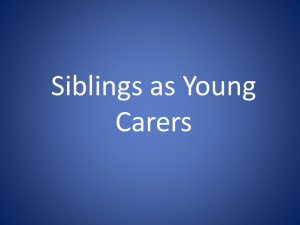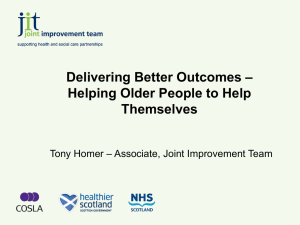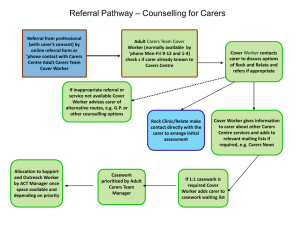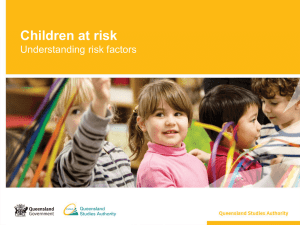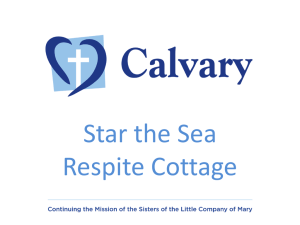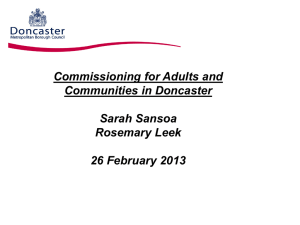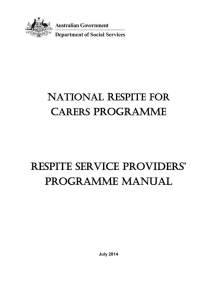NHS Nottingham City engagement with carers on respite breaks
advertisement
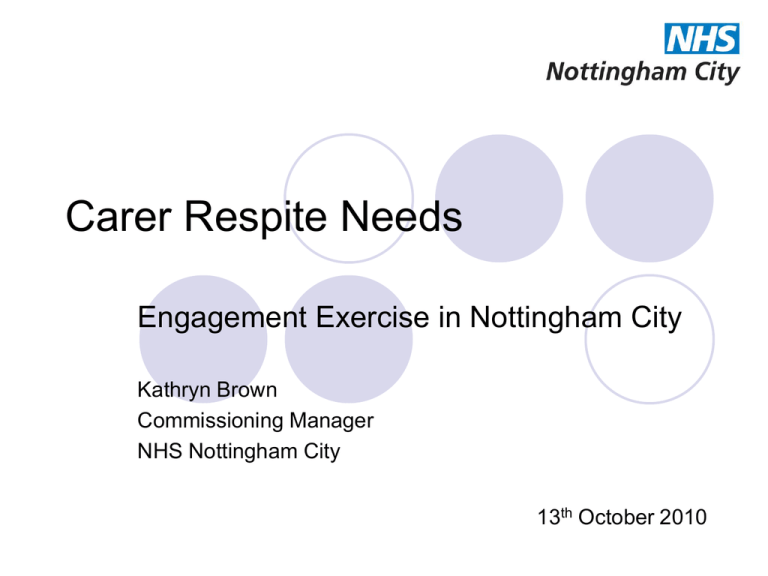
Carer Respite Needs Engagement Exercise in Nottingham City Kathryn Brown Commissioning Manager NHS Nottingham City 13th October 2010 Rationale for engagement A carer is someone who, without payment, provides care and support to a partner, child, relative, adult, friend or neighbour, who could not manage without their help. This could be due to age, physical or mental illness, addiction or disability. NHS Nottingham City’s commissioning intention for 2010-11 and 2011-12 is to increase carer respite provision so that carers can be supported to take a break from this non-paid role; the risk being that they otherwise could become exhausted themselves and fall ill. The objective of the exercise was to engage with local providers across a range of care groups in order to understand the local issues and priorities and to break down the definition of ‘respite care’ in order to inform future commissioning plans. Process of engagement An advert was placed on Supply2Health to identify local providers interested in engaging with their local community. Interested organisations responded to the advert and bid for small funded grants to conduct carer engagement and develop a report to be submitted to the commissioners of NHS Nottingham City. Specific initiatives included questionnaires; focus groups; interviews; ‘wish the fish’; film making… Seven organisations were successful in securing grants that ensured engagement across a broad section of care groups from Nottingham City. The care groups included: End of Life Care HIV/AIDS Learning disability Long Term Conditions Mental health Neurological conditions Physical and Sensory Impairment Stroke Substance Misuse Outcomes Specific issues. Carers of those with substance misuse problems stated that they can only access support through the GP once the individual has acknowledged that they need help, thus potentially leaving the carer without support for what could be a long time; the only opportunity for respite being once the individual is in de-tox in-patient care. The learning disability response focused on the issues of transition for children going into adult services and the perceived lack of flexibility, consistency and frequency of the adult care packages. Carers of people with mental health needs identified a common occurrence in accessing respite breaks and the sometimes inflexible nature of care, in that planned breaks had to be cancelled at the last minute as the cared for ‘…was in no mood to accept. Many holiday deposits had been lost in this way.’ Respite care for children included mainly supporting activities, groups and clubs. It was felt that these activities could be broadened to include time to spend with their friends, not necessarily other young carers. Outcomes cont’d… The most common theme across all of the reports received was that the services should be tailored to meet the individual and not created as a ‘one size fits all’ approach. Other common themes: Information Be-friending Day Centres Emergency Contact Days Out Carer breaks Care at Home Residential Care Objectives and Outcomes The funding available to NHS Nottingham City will seek to achieve the following objectives: To provide additional opportunities to allow carers to take a break To fill gaps in services and care groups where limited support currently exists To test innovative ways of providing respite that are attractive and flexible To support the implementation of the national Carers’ Strategy recommendations The funding available to NHS Nottingham City will seek to achieve the following outcomes: Carers feel supported in their role as carer Improved access to respite for carers Improved quality of life and the promotion of dignity and self worth for carers and patients A contributory reduction in unnecessary emergency hospital admissions Commissioning Plans for 2010-12 (In no particular order): To establish a joint commissioning group between NHS Nottingham City and Nottingham City Council so that joint opportunities can be identified and funding can be used more effectively to reach more carers in a coordinated approach, including the development of service directories and supporting information; To scope opportunities to create additional day care respite; To scope opportunities to create more peer support/be-friending groups; To explore services to support carers of stroke survivors within the home; To identify innovative day time or evening events that can provide both the carer and cared for some entertainment, across all care groups; To support the Marie Curie Helper pilot that works with volunteers to provide at home respite for carers of patients with palliative and end of life care needs. These intentions will be developed into service specifications following a process of market analysis and will be implemented over the next 6 – 18 months. With thanks and any questions? NHS Nottingham City would like to give thanks to the following organisations and the participants within each engagement exercise: Bright Ideas British Red Cross Carers Federation Nottingham Mencap Nottinghamshire Hospice Radford Care Group Speaking Up ANY QUESTIONS?
